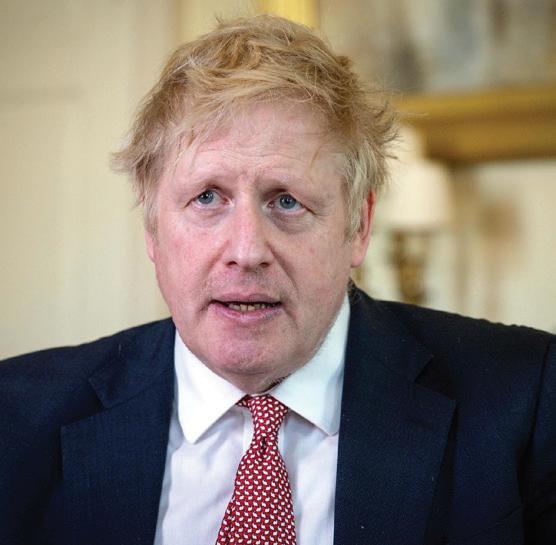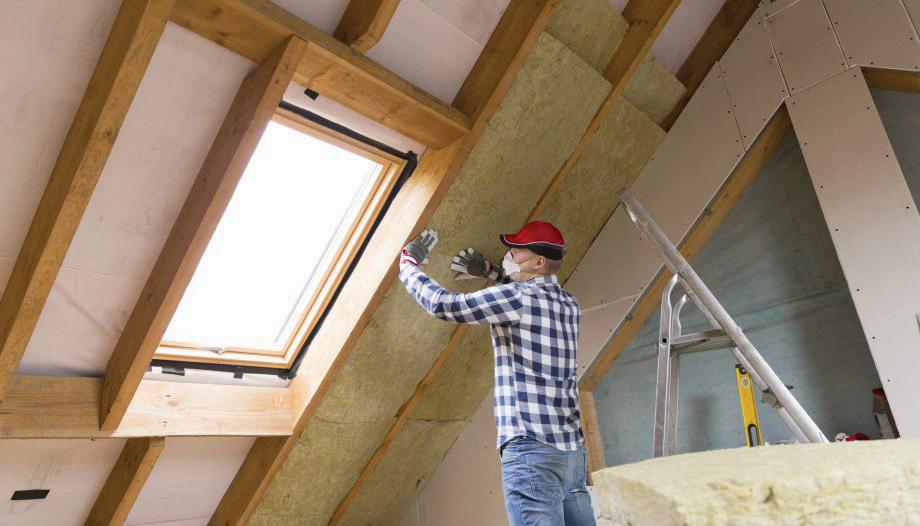
15 minute read
News Update
news update
Advertisement
Climate change ‘set to disrupt up to 10m jobs’
The UK’s climate change targets threaten almost twice as many jobs in the Midlands and north as in London and the south east, a recently published report says.
Up to 10m jobs will be disrupted by the UK’s legally binding commitment to become carbon neutral by 2050 and 52 per cent are concentrated in the north, Midlands or Scotland, the research found.
The poorest regions could be hit hardest by the race to cut emissions. This will be a fresh blow for places that were blighted by deindustrialisation in the 1980s and 1990s, the report by think tank Onward, warns.
The authors said that the results showed the need for a government plan to “smooth the transition” for communities that rely heavily on carbon-intensive industries and face by far the greatest threat.
But as the UK goes further and faster to delivering net zero there will increasingly be geographic, political and economic trade offs that need to be better understood and mitigated.
Looking at the distribution of jobs in industries that contribute more than 2 per cent of UK carbon emissions, Onward finds that the UK’s least prosperous regions disproportionately rely on heavily emitting industries for jobs at present.
The East Midlands has the highest proportion of jobs in high emitting industries (42 per cent).
This region is closely followed by the West Midlands (41 per cent), Yorkshire and the Humber (38 per cent), and the North West (38 per cent).
In contrast, London and the South East have the lowest proportion of jobs in high emitting industries, with 23 per cent and 34 per cent, respectively.
GREEN INDUSTRIAL REVOLUTION
Efficiency at heart of Ten Point Plan
Improving the energy efficiency of buildings is a key part of the Prime Minister’s Ten Point Plan for a green industrial revolution. He is emphasising the employment potential of “making our homes, schools and hospitals greener, warmer and more energy efficient.” During the present decade, he has committed the UK to reducing emissions by 68 per cent since 1990, increasing earlier targets by over 10 per cent.
However, within days the Chancellor of the Exchequer had issued a document which revealed in its small print that next year will see a near 90 per cent drop in size of the government’s flagship Green Homes grant programme for England.
Originally started last October, the programme is backed by £1.5bn of grant support for just the six months to this March. The Prime Minister described it in a speech to the United Nations as “huge, very, very ambitious.” It would, Mr Johnson promised, “be changing the windows, changing the boilers, changing the lagging. “Indeed, he chortled that “we will never be caught lagging on lagging.”
Some 600,000 existing homes are officially set to be energy improved during this period This initiative is intended to stimulate investment in energy efficiency equipment at the equivalent of £3bn a year.
Installers have been urged to sign up to this programme, by becoming accredited with the TrustMark organisation. There has been much media criticism coming from householders regarding the scarcity of participating installers.
Initial reluctance to expend timing and funds to register with TrustMark had largely been due to the short-term nature of the programme, together with a convoluted qualification mechanism of primary and secondary measures. The latter complication has led to very few of the nation’s 10,000 glazing companies getting involved.
Announcing expenditure plans for 2021/22, Chancellor Sunak made great play of the fact that he was responding to concerns about the programme ending after just six months, by promising it would continue until the end of March 2022. What he did not emphasise is that the second scheme will have a total budget of just £325m over the entire 12-month period.
This means that the deemed expenditure and hence activity rate will be running at just 11 per cent of the first scheme, scheduled only for the current financial year. While the second year of the scheme will operate under broadly the same rules as currently, all funds allocated for the current financial year will have to be spent by the end of this March. There is no arrangement made to carry over any unspent funds to year 2021/2022.
Next year’s diminished budget may well deter many more companies from signing up as trainers and installers. Particularly as there is as yet no public commitment to continue with any scheme at all to improve UK buildings after March 2022.
ePrivacy legislation could hamper clean energy sector
There are warnings that proposed ePrivacy legislation currently under discussion would hamper many new business models in the clean energy sector. These models are almost all based on the collection and treatment of data by home equipment and smart meters, warns a sustainable energy campaign group.
Consumers would need to give their prior consent to companies processing energy data from equipment installed in people’s homes. Anybody could revoke that consent at any moment, without advance notice. “This makes data processing for innovative energy services practically impossible, even where only business data is involved,” argues smartEn, an association for digital and decentralised energy solutions. “Almost all innovative business models in the energy sector are based on the processing of consumption, condition, and measurement of data. “
The campaign’s warning illustrates a shift in the public debate about data privacy in the digital age. Concerns over data protection have until now been centred largely on people’s internet browsing behaviour, advertising, social media, and platforms such as Uber or AirBnb. With the digitalisation of electricity, the debate now firmly enters the energy realm.
“The ePrivacy concept is not just about cookies and online advertising. It could also have far-reaching consequences for new business models in the energy sector,” said Frauke Thies, executive director of smartEn.
“Innovative energy services rely on specific data, for example for energy management systems, e-mobility services and smart home applications which help consumers save money and support the clean energy transition,” she warned.

news update
BUSINESS TAX RATES
CBI calls for business tax exemption
Government should exempt green technologies and energy efficiency investments from business tax rates in order to accelerate the net zero carbon transition, according to the UK’s biggest business group, the Confederation of British Industry.
The CBI argues that the current business rates system actually penalises firms that invest in their property, imposing an immediate higher business rates bill. Knowledge of this often discourages firms carrying out green renovations to their buildings.
As use of buildings accounts for 40 per cent of the UK’s total carbon footprint, investments in decarbonising properties should be a major priority for companies. So business rates need reforming to incentivise green building upgrades.
With the government’s fundamental review of the business rates system, concluding this spring, the CBI wants an exemption provided to green upgrade measures that improve a property’s energy efficiency.
Implementing such reforms could unleash a wave of green investment to help decarbonise the UK’s built environment, helping support the economic recovery from Covid-19 while furthering the net zero agenda, argued CBI chief economist Rain Newton-Smith. “The upcoming review is a key chance to create a modern, sustainable new system that keeps pace with a changing economy and new technologies, “ she said. “Unlocking widespread business investment can power a UK recovery, create thousands of green jobs and boost productivity post-pandemic. “
Exempting green building upgrades and technologies from business rates would also ease pressure on businesses in the wake of the pandemic. This has drastically reduced investment in the UK by almost three times as much as the last financial crisis in 2008, according to Newton- Smith.
Business investment fell by a record 27 per cent during 2020, a much larger hit than experienced by other G7 countries. “With companies already strapped for cash and investment, pressing go on their net-zero plans seems like an uphill struggle, “ she said. “The need for business rates reform is recognised across the board. A new rates system has the potential to power a UK green revolution and spur investment. “

Pandemic contributes to plummeting investment
Investment in energy efficiency looks set to plummet by almost 10 per cent in 2020, according to a new report by the International Energy Agency.
Global primary energy intensity – a key indicator of how efficiently the world’s economic activity uses energy – is expected to improve by less than 1 per cent this year, the weakest rate since 2010, according to Energy Efficiency 2020, the latest edition the IEA’s annual update on efficiency trends. This is well below the 3 per cent annual level of improvement needed to achieve the world’s shared goals for addressing climate change, reducing air pollution and increasing access to energy.
Energy efficiency’s weakest progress in a decade threatens international climate goals and makes the next three years a critical period for reversing this worrying trend, the report says.
The disappointing trends are being exacerbated by a plunge in investments in energy-efficient buildings, equipment and vehicles amid the economic crisis triggered by the pandemic, the report finds. Purchases of new cars, which are more efficient than older models, have slowed, while construction of new, more efficient homes and other buildings is also expected to decelerate. In industry and commercial buildings, lower energy prices have extended payback periods for key efficiency measures by as much as 40 per cent, reducing their attractiveness compared with other investments. Overall, investment in energy efficiency worldwide is on course to fall by 9 per cent in 2020.
“Together with renewables, energy efficiency is one of the mainstays of global efforts to reach energy and climate goals. While our recent analysis shows encouraging momentum for renewables, I’m very concerned that improvements in global energy efficiency are now at their slowest rate in a decade,” said Dr Fatih Birol (left), executive director of the IEA.

IN BRIEF
Crisp maker cuts emissions by 70%
Potato crisp manufacturer Walkers has adopted a technique it says will cut CO2 emissions from its manufacturing process by 70 per cent.
The firm has installed an anaerobic digester, which feeds potato waste to bacteria to produce useful methane. The methane is burned to make electricity for the crisp-frying process – so this saves on burning fossil fuel gas.
The new system will go a step further by taking away potato “cake” left after digestion - and stirring the brewery CO2 into it to make an enriched fertiliser which will help put carbon back into the soil as well as encouraging plant growth.
Interactive map to show local policies
As part of the Accelerator Cities programme the UK Green Building Council has launched an interactive map designed to showcase leading local authority policies and programmes which address domestic energy efficiency.
The map, which highlights leading local and combined authorities across the UK, is a live resource to support officers responsible for driving local retrofitting programmes, including those directing the Green Homes Grant funding. Users can navigate the map to identify relevant examples of best practice from neighbouring authorities and draw upon lessons learned from existing policies and programmes.
Heat pump roll out could falter
The Government’s ambition to install 600,000 heat pumps a year by 2028 could fail unless there are enough skilled engineers in the supply chain, a multi-year extension is given to the Green Homes Grant and making sure the devices are affordable.
The warning comes in a letter to Energy Minister, Kwasi Kwarteng, from the chairman of the Environmental Audit Committee, Philip Dunne MP, after the committee heard evidence on technological innovations and heat pumps.
news update
Regional leaders pledge net zero target of 2045
Thirty-eight regional leaders from Edinburgh to Cornwall are pledging to eliminate greenhouse gas emissions by 2045 – five years earlier than the target set by the UK government.
The cross-party group of city mayors and council leaders represent more than 20 million people from areas such as Birmingham, Bristol, Glasgow and Greater Manchester.
They will sign the ‘UK100 Net Zero pledge’ that explicitly commits them to making their council’s carbon neutral by 2030.
Furthermore, they will pledge that their residents and businesses will be ‘net zero’ by 2045, meaning that virtually all emissions will have been eliminated and those that haven’t will be offset, for example by planting trees.
The pledge has been co-ordinated by the UK100 NGO, a group of local leaders campaigning for cleaner air and less emissions.
“These ambitious local leaders have pledged to do everything within their power to reach Net Zero emissions as soon as possible in a way that benefits their communities with new jobs and skills. Local leadership, alongside funding and powers is key to winning the Race to Net Zero,” said UK100 director Polly Billington.
The local UK leaders will work together over the coming year to push for more funding and powers from central Government which will enable them to go even “further and faster” in the journey to net zero.
Mayor of Greater Manchester, Andy Burnham, said: “We are proud to be supporting the UK100 Net Zero Pledge and making the case for urgent collective action to tackle the climate emergency.”
ENVIRONMENTAL AUDIT COMMITTEE
Departments lack joined up thinking
The powerful House of Commons Environmental Audit Committee concluded its hearings on policies to improve energy efficiency in existing buildings with an unprecedented session cross-examining simultaneously ministers from three relevant departments. These were the Treasury’s Exchequer Secretary (Kemi Badenoch (right)), the Housing Minister (Chris Pincher), and the then Energy Minister (Kwasi Kwarteng).
It was clear that each Minister had certain absolute policy priorities. Pincher – the tenth housing minister in the last eight years—stressed that his Ministry “focussed in large part on building new homes.” Asked directly by Conservative committee chair Philip Dunne, “are you not engaged with retrofit?”, Pincher replied: “I am focussed on building new houses (sic), not on retrofit.”
In a general discussion about how much expenditure eco-refurbishment might each home need, Pincher said that his Ministry, covering local government as well as housing, held “no figures on the costs of energy improving existing housing. “
Responding to the same question, Kemi Badenoch, the Treasury minister said they were looking only at macro The first boilers in the UK to utilise hydrogen are now heating homes in Northumberland.
The HyStreet test site in Spadeadam is made up of specially built demonstration houses where over 200 tests have been completed to research and confirm the safety of switching homes and gas networks to hydrogen.
The project, which is part of level for buildings improvement which she put at a nationwide total £45bn, with an average cost of £3,000 per home.
This, said Dunne, was way below the figures others are citing to the EAC. He instanced a Leeds Council estimate that, in their city alone, up to £16bn will be needed to bring just Leeds’ 340,000 homes up to Energy Performance Certificate standard C. Dunne described the Treasury figure as “woefully inadequate.” Badenoch admitted the Treasury is “still very much at the beginning of the process.”
Badenoch added that the Treasury now prefers grants to loans, because the latter are “treated just like capital Ofgem’s Network Innovation Competition H21, is headed by Northern Gas Networks with partners that include Cadent, Scottish Gas Networks, Wales & West Utilities, National Grid, DNV GL and the Health and Safety Executive’s science division. H21 is showing how current natural gas networks can be repurposed to spend” - even though the loan is eventually paid back to the Exchequer. Grants “upskill fairly quickly for jobs, they are the best subsidy you can give.” She warned: “we won’t get involved with green mortgages” and had “no plans for stamp duty rebates, but the issue is kept under review.” She stated that the Treasury again had “no plans” to reintroduce landlords’ energy tax allowances that stimulated efficiency investment.
Summarising, Badenoch stressed that the Treasury now reckoned that the best way of promoting energy efficiency investment was “regulation” for “the medium and long-term, across the entire market.”
When asked about paying for the Energy Company Obligation from taxes, she described funding via fuel bills as a “proven delivery model” that “provides confidence to the energy efficiency industry.” ECO is working as it is “reducing fuel bills.”
Kwarteng endorsed the general confidence in EPCs, instancing the Business Department’s current consultation on upgrading minimum standards to C for both the private and public rented sectors. He said there were still 16.5m homes in England

Required decarbonisation rate continues to soar
A decarbonisation rate of 11.7 per cent per annum is now required to keep warming within 1.5°C - five times greater than what was achieved prior to the pandemic (2.4 per cent), according to new analysis from PwC.
The PwC Net Zero Index shows that, based on current trends in energy consumption and CO2 emissions generation, the century’s global carbon budget would be used up by the end of this decade. It sets the scene for a decade requiring unprecedented progress in solutions, investment, skills and technology transformation across business, government and society. As global economies plan their emergence from the pandemic, the Index provides a warning sign of the risks of a return to “business as usual.”
Dr Celine Herweijer (above), Global Climate Change Leader, and Partner at PwC UK, said: “Every year we underachieve on cutting carbon, the task gets tougher and the transition required is more radical. We now need decarbonisation and ultimately transformation of companies, industries and geographies at an unprecedented scale and speed. The good news is that when public policy, public interest, technological innovation and investment line up, we can see how fast systems can transform - the automotives industry today being a case in point.”
Hydrogen heating comes to Northumberland homes
below C standard. safely carry 100 per cent hydrogen.
The first demonstration has seen Worcester Bosch & Baxi Heating install combi-boilers into the houses on HyStreet. The programme is part of the UK Government-funded Hy4Heat programme which is also helping the development of hydrogen-ready gas cookers, fires and gas meters.







